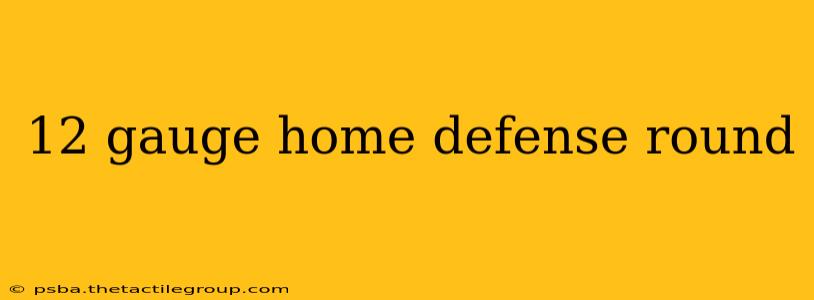Choosing the right ammunition for home defense is a critical decision, and for those opting for a 12-gauge shotgun, the selection process becomes even more important. The 12 gauge offers a powerful stopping force, but the sheer variety of rounds available can be overwhelming. This guide will delve into the characteristics of different 12-gauge home defense rounds, helping you make an informed choice based on your specific needs and circumstances.
Understanding the Stakes: Home Defense Ammunition Requirements
Before diving into specific rounds, let's establish the key requirements for effective home defense ammunition:
- Stopping Power: The primary goal is immediate incapacitation of a threat. This requires a round that delivers substantial energy transfer upon impact.
- Reduced Overpenetration: While stopping power is crucial, it's equally vital to minimize the risk of rounds passing through the intended target and endangering innocent bystanders or neighbors.
- Reliable Functioning: In a high-stress situation, your firearm must function flawlessly. Ammunition selection plays a crucial role in ensuring reliable cycling and feeding.
- Pattern Density: Shotgun pellets spread, forming a pattern. A tight, consistent pattern at typical home defense ranges (under 25 yards) maximizes the chance of hitting the target.
Top 12 Gauge Home Defense Round Contenders
Several 12-gauge rounds stand out for home defense applications. Each offers a unique balance of stopping power and reduced overpenetration:
1. Reduced Recoil Buckshot:
- Pros: Lower recoil makes follow-up shots easier, especially for less experienced shooters. Offers good stopping power at close range.
- Cons: May not offer the same penetration as heavier buckshot loads.
2. #4 Buckshot:
- Pros: Excellent balance between stopping power and reduced overpenetration. Provides a good number of pellets for effective shot placement.
- Cons: Recoil can be significant for some shooters.
3. 00 Buckshot:
- Pros: High stopping power, fewer, larger pellets penetrate deeply.
- Cons: Increased risk of overpenetration compared to smaller buckshot sizes. More significant recoil.
4. Low-Recoil 00 Buckshot:
- Pros: Attempts to mitigate the recoil of 00 buckshot, making follow-up shots more manageable.
- Cons: May slightly reduce penetration compared to standard 00 buckshot.
Factors Beyond the Round Itself
Choosing the "best" round involves more than just looking at pellet size. Consider these crucial factors:
- Your Shotgun: Different shotguns perform differently with various ammunition types. Testing your specific firearm with different loads is essential to ensure reliable functioning.
- Your Shooting Skills: Practice is key. Accuracy is more important than the type of round. A well-placed shot with a less powerful round is far more effective than a poorly aimed shot with a powerful one.
- Your Home Environment: Consider the construction of your home and the potential for overpenetration. Thinner walls necessitate a more cautious approach to ammunition selection.
Conclusion: Informed Choice is Paramount
Selecting the right 12-gauge home defense round requires careful consideration of several factors. While this guide provides valuable information, it's crucial to conduct thorough research, practice extensively, and possibly consult with firearms experts to make the most informed decision for your unique circumstances. Remember, responsible gun ownership includes understanding your ammunition and its capabilities. Safety and accuracy should always be paramount.

